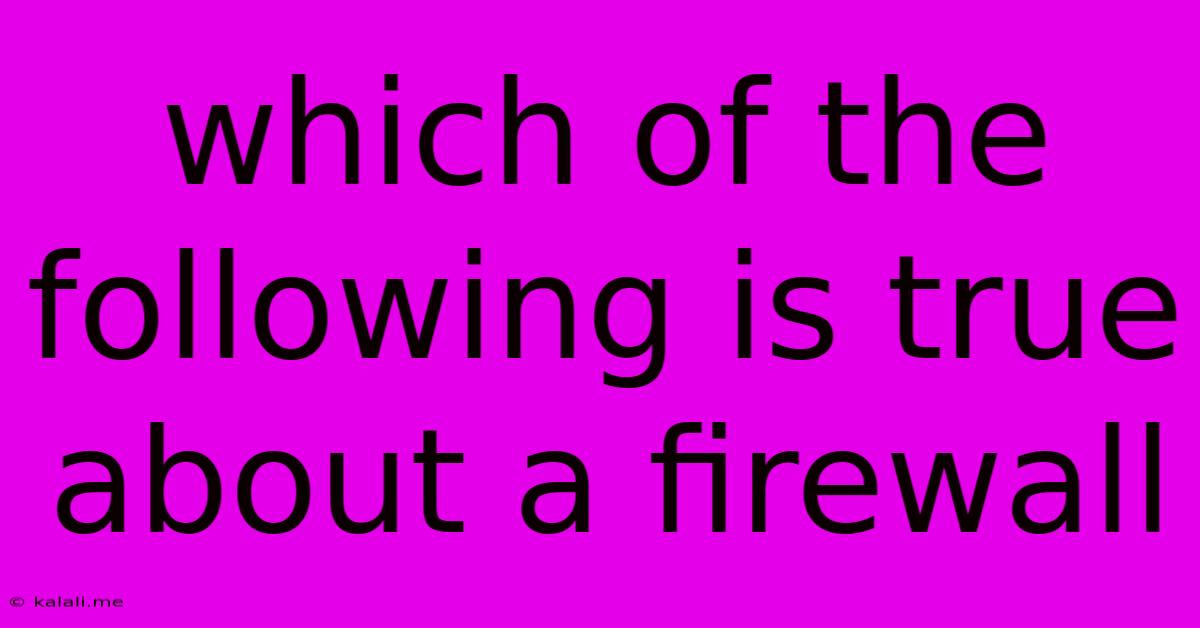Which Of The Following Is True About A Firewall
Kalali
Jun 13, 2025 · 3 min read

Table of Contents
Which of the Following is True About a Firewall? A Comprehensive Guide
A firewall is a crucial component of any network security strategy, acting as the first line of defense against unauthorized access and malicious threats. But understanding exactly what a firewall does and doesn't do is key to effective cybersecurity. This article will clarify common misconceptions and highlight the truth about firewall functionality.
Meta Description: This article explores the truth about firewalls, clarifying common misconceptions and explaining their role in network security, including packet filtering, stateful inspection, and application control.
What a Firewall Actually Does
At its core, a firewall examines network traffic – both incoming and outgoing – and decides whether to allow or block it based on a predefined set of rules. These rules are configured based on various criteria, including:
- IP Addresses: Firewalls can block or allow traffic based on the source and destination IP addresses. This is a fundamental aspect of network segmentation and security.
- Ports: Network services utilize specific ports (e.g., port 80 for HTTP, port 443 for HTTPS). Firewalls can restrict access to specific ports, preventing unauthorized access to sensitive services.
- Protocols: Firewalls can differentiate between various network protocols (e.g., TCP, UDP, ICMP). Understanding the protocols used is critical in allowing legitimate traffic while blocking malicious attempts.
- Applications: More advanced firewalls go beyond simple port filtering and can identify and control traffic based on the specific application being used (e.g., blocking access to specific websites or applications).
Types of Firewalls and Their Capabilities
Several types of firewalls offer different levels of protection:
- Packet Filtering Firewalls: These are the simplest type, inspecting individual data packets based on the header information (IP address, port, protocol). They are relatively fast but lack the context of the overall network session.
- Stateful Inspection Firewalls: These firewalls track the state of network connections, providing better security by examining the context of the data flow. This helps to prevent many types of attacks that rely on manipulating connection state.
- Application-Level Gateways (Proxies): These firewalls inspect the application data itself, providing the most granular control over network traffic. They often act as intermediaries, filtering and controlling access to specific applications.
- Next-Generation Firewalls (NGFWs): NGFWs combine the features of packet filtering, stateful inspection, and application-level control, often adding features such as intrusion prevention systems (IPS) and deep packet inspection (DPI) for enhanced security.
Common Misconceptions About Firewalls
It's crucial to understand what firewalls don't do:
- Complete Protection: Firewalls are a vital part of a security strategy, but they are not a silver bullet. They cannot protect against all threats, including sophisticated attacks that exploit vulnerabilities within applications or operating systems.
- Antivirus Replacement: Firewalls do not replace antivirus software. Antivirus software is needed to detect and remove malware that may have bypassed the firewall's defenses.
- Guaranteed Data Privacy: While firewalls protect against unauthorized access, they don't inherently encrypt data. Data encryption is a separate security measure needed for data privacy.
Conclusion: Firewalls – A Critical, But Not Sole, Security Measure
In summary, a firewall is a crucial component of network security, controlling network traffic based on predefined rules. While different types offer varying levels of protection, from basic packet filtering to advanced application control, it's essential to remember that a firewall is only one part of a comprehensive security strategy. It must be complemented by other security measures, such as antivirus software, intrusion detection systems, and regular security audits, to achieve robust protection against modern cyber threats. A layered security approach is always the most effective.
Latest Posts
Latest Posts
-
Operant Conditioning Is Also Known As
Jun 14, 2025
-
Columbia University New York Gpa Requirements
Jun 14, 2025
-
Bronze Is A Mixture Of What
Jun 14, 2025
-
Speed Of Light In Terms Of Mu And Epsilon
Jun 14, 2025
-
Which Of The Following Is A Function Of The Skeleton
Jun 14, 2025
Related Post
Thank you for visiting our website which covers about Which Of The Following Is True About A Firewall . We hope the information provided has been useful to you. Feel free to contact us if you have any questions or need further assistance. See you next time and don't miss to bookmark.